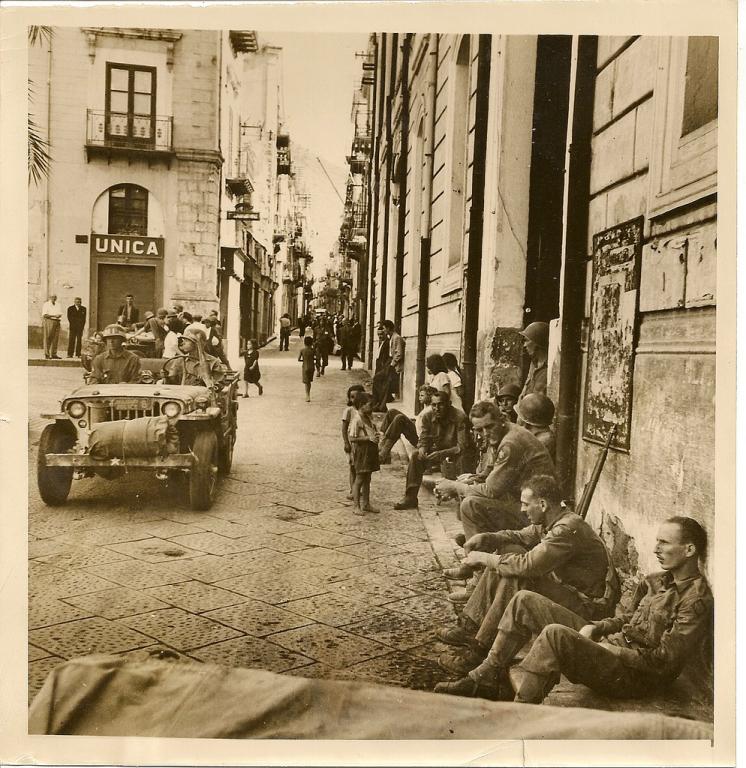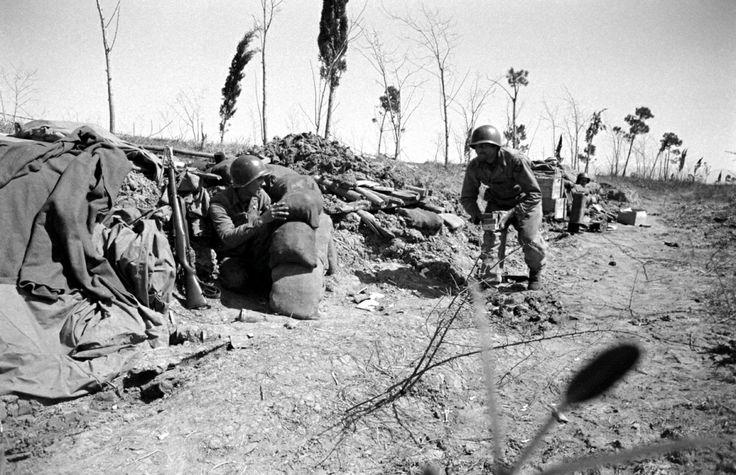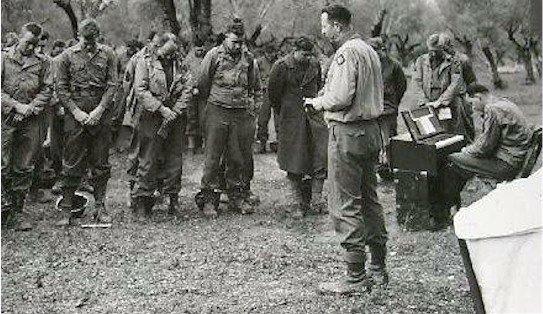Field service: 45th "Thunderbird" Division; Source: U.S. Army Chaplain Center and School Chaplain Lt. Col. William E. King performs outdoor Christmas services for the 45th Infantry Division, Italy, 25 December 1943.
Two months after the 45th Infantry Division was activated in 1940, William King joined it and prepared to go to war for the second time. He had already experienced World War I as a Navy man.
In peacetime, the “Cowboy Preacher” as he was known by those who knew him best, served as pastor of the Maywood Baptist Church in Kansas City, Mo. During World War I, Chaplain William E. King served as a Navy gunner on several merchant ships, two of which were torpedoed while he was on them. He was only 16 years old when he enlisted and wouldn’t finish high school until after the Great War.
“But all those students, and even the teachers, seemed so silly to me when I got back,” Chaplain King was quoted as saying in a Dec. 28, 1943 article in the Mediterranean issue of Stars and Stripes. “When you’re in a war, you get a different kind of education. You get an education in the simple fundamentals of life and death, with everything else stripped away. That’s why I became a chaplain, I guess.”
A more mature King would join the famed 45th Infantry Division during World War II. A rather tall man, King was a frontline chaplain with a gawky body and deep, rich voice, who knew what it was like to crawl on his belly through the Germanlines. During the battle of San Rosso Hill his courage and faith were on full display when an American Soldier lay mortally wounded on a highway between friendly and enemy lines.
In an excerpt from The Best and Worst of Times, The United StatesArmy Chaplaincy 1920-1945 author Robert L. Gushwa tells the story. The Germans let the group reach the body and wrap it in a blanket; as they were lifting it into the jeep, an 88 mm German anti-aircraft and anti-tank artillery gun opened up on the men, Gushwa explained. Chaplain King directed the men to take cover while he drove back to friendly lines through the enemy fire. Unfortunately the Soldier died and in the dead man’s pocket were five unopened letters from home that Chaplain King delivered to him on the front lines the previous night.
There are lots of stories about the famous 45th chaplain. A few days earlier, Chaplain King was slightly wounded while carrying water to frontline troops attacking a hill.
“The boys needed water badly, so I and a helper took it up to them,” King was quoted as saying. “I put down a five-gallon can when it exploded straight up. A piece of shrapnel grazed my right hand and cut a hole in my right trouser leg, while my companion was more seriously hurt.”
Near Caltagirone Sicily, King demonstrated under fire that he was ready to minister to both friend and foe, an experience shared by several chaplains throughout the war. As big guns and tanks slugged it out, King crawled to assist a German, whose leg was fractured by machine gun bullets.
He knelt behind a low stone wall, made temporary splints, bandaged the enemy Soldier and gave him water. He discovered that the German was flown there only the day before and had been on the front lines just eight hours.
“He patted my hand and (appeared grateful), saying afterward through an interpreter that he had been told Americans mutilated their prisoners,” King is reported to have said.
Late in the war, King who would go on to become the first chaplain to minister to Soldiers in concentration camps at Buchenwald, Auschwitz and Dachau, and also occupied an administrative position both with the 45th Infantry Division and with VI Corps. But those who knew him best said he didn’t look like an “armchair officer” and his Army records indicate he was anything but your typical “desk jockey.”
During World War I, Chaplain King earned the Silver Star Medal and the Navy Good Conduct Medal. During World War II, while serving in many of Europe’s bloodiest battles, the chaplain earned the Bronze Star Medal with oak leaf cluster, the Purple Heart Medal with oak leaf cluster, the Arrowhead for four invasions and six battle stars for participating in as many engagements.
His Bronze Star was earned on the battlefield at Anzio. The cluster to the star was earned in an earlier action in Sicily and awarded him for taking care of wounded in the 179th Infantry while they were under fire after being caught in an ambush.
He was wounded first near Finale, on the northern coast of Sicily, while, as he told the Abilene Reporter-News in July 1945, “I was carrying some water up a hill to some fellows.”
Chaplain King died in the summer of 1985 at the age of 84.Information

Warning: This is a relatively older thread
This discussion is older than 360 days. Some information contained in it may no longer be current.
- Knowledge Library

- MKL Entry of the Month
- Australia
- Austro-Hungarian Empire
- Canada
- Czechoslovakia
- Denmark
- Finland
- France/Belgium
- Germany
- Italy
- Japan
- Norway
- Russia
- South America
- Sweden
- Switzerland
- Turkey
- United Kingdom
- United States
- Yugoslavia
- Is my rifle authentic or a fake?
- Jay Currah's Lee Enfield Web Site
- On-line Service Records (Canada)
- Technical Articles/Research
- Forum
- Classifieds

- What's New?
-
Photo Gallery

- Photo Gallery Options
- Photo Gallery Home
- Search Photo Gallery List
-
Photo Gallery Search
- Video Club

- iTrader














 PM
PM
